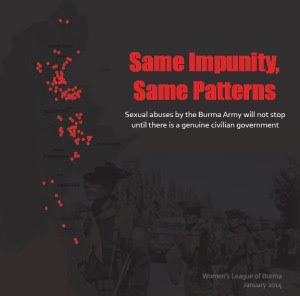In an interview with Karen News, Nan Dah Eh Kler, Chairperson of the Karen Women Organization (KWO), argued that the Burma’s Government’s reform process was being undermined by a culture of impunity and sexual violence in the Burma Army.
 Referring to a report released by the Women’s League of Burma (WLB), which documented over 100 cases of sexual violence committed by the Burma Army since 2010, Dah Eh Kler, said that sexual violence was a “serious concern” for women, especially in ethnic areas.
Referring to a report released by the Women’s League of Burma (WLB), which documented over 100 cases of sexual violence committed by the Burma Army since 2010, Dah Eh Kler, said that sexual violence was a “serious concern” for women, especially in ethnic areas.
“We cannot say that Burma is reforming and changing meaningfully while ethnic women and girls are being raped and abused. Even after the current civilian government came into power in 2010, acts of sexual violence are still taking place.”
Dah Eh Kler maintained that the lack of a nationwide ceasefire was a key in helping to stop the sexual violence.
“If there is no genuine peace agreement between ethnic groups and the Burma Government, women will continue to be the subject of sexual violence, especially in ethnic areas. The present situation is one of inequality between the mainly Burmese government and ethnic minorities of Burma. Conflict affects ethnic areas so, consequently, the dangers of sexual violence to women in these areas never end,” she said.
Women’s Voices Must Be Heard
The Karen Women’s Organisation is a community-based organization that represents more than 49,000 ethnic Karen women. Dah Eh Kler said that women were just as capable of running the country as men, but unequal power rested with men.
“A lot of women are qualified to be able to lead our communities, but most women only have opportunities to work as social workers, while important political roles, such as participating in the leadership of the country, are dominated by men.”
Dah Eh Kler called on both the Burma Government and ethnic ceasefire groups to respect women’s voices in the ceasefire process.
“It is vital to involve women in the peace building effort,” she said, adding, “If we look now, few women are involved in the government’s peace talk process, this is a failure of Burma’s commitment to the United Nations Security Council Resolution 1325. The ethnic groups involved in the ceasefire could do better on addressing this issue as well.”
The UNSC Resolution 1325 urges “all actors to increase the participation of women and incorporate gender perspectives.”
It also calls on “all parties to conflict to take special measures to protect women and girls from gender-based violence, particularly rape and other forms of sexual abuse, in situations of armed conflict.”



